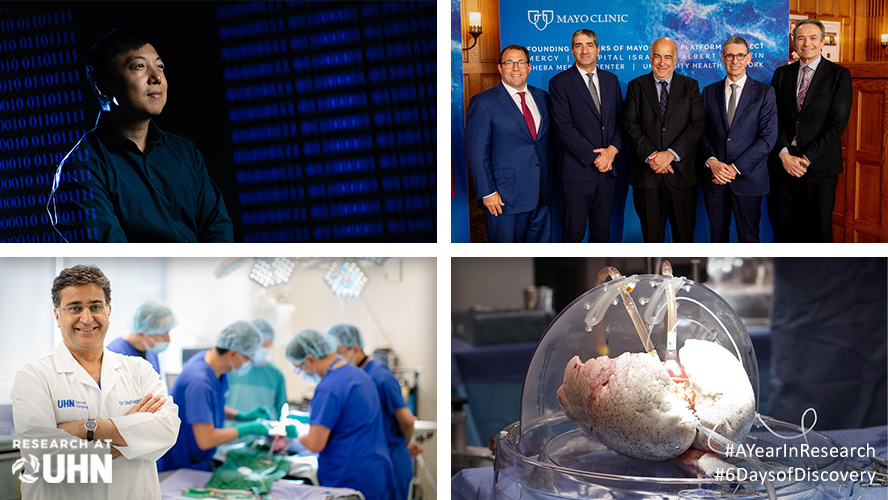
In today's rapidly evolving world, artificial intelligence (AI) is revolutionizing industries globally, and health care is no exception. As one of the world’s leading research institutions, UHN is at the forefront of this transformation, integrating AI to improve patient care, drive innovation and shape the future of medicine.
Setting the Standard in AI Innovation
AI is changing the landscape of health care, offering solutions once considered beyond reach. By analyzing vast amounts of data, AI personalizes treatment plans, optimizes therapies and even predicts health outcomes.
At UHN, this vision comes to life through the appointment of Dr. Bo Wang as Canada’s first Chief AI Scientist at a hospital, reinforcing the pivotal role of AI in advancing patient care. The UHN AI Hub, a UHN Collaborative Centre dedicated to AI research, plays a key role in transforming these innovations into practical tools for health care providers and patients alike. This reflects UHN’s focus on empowering research teams to collaborate across disciplines and unleash the power of technology and innovation. Under the leadership of Dr. Wang and UHN's Chief of Innovation, Dr. Shaf Keshavjee, the UHN AI Hub drives cross-disciplinary collaborations across medical fields like cancer, cardiovascular disease and transplantation unlocking the potential for AI-powered care and treatment.
Transforming Cancer Care with AI
At the Princess Margaret Cancer Centre, the Cancer Digital Intelligence (CDI) program is using AI to reshape cancer care. AI enables earlier diagnoses, personalized treatments, and improved outcomes by helping clinicians predict patient responses with precision. The program also streamlines clinical trials and treatment planning through digital tools, ensuring patients receive care tailored to their unique needs. These advances enhance survival rates and improve quality of life, showing how AI’s impact extends far beyond research. This directly supports UHN's priority to accelerate the translation of discovery into practice by turning research breakthroughs into patient care innovations.
Advancing Medical Procedures with AI
AI is also being applied to transform critical procedures. At Toronto General Hospital Research Institute (TGHRI), scientists are using AI to revolutionize lung transplantation and surgery. AI-driven tools assess donor lung suitability with ex vivo lung perfusion (EVLP), increasing the success rate of transplants and offering patients renewed hope. By reducing subjectivity in organ assessments, AI makes data-driven decisions that lead to more successful transplants.
In the surgical suite, AI is enhancing precision. At TGHRI, surgeons are using AI to guide them through complex procedures like aneurysm repairs. By identifying “No-Go” zones, AI reduces complications, improves real-time decision-making and leads to faster recoveries and safer outcomes.
Driving Global Collaboration for Impact
Collaboration is critical in advancing AI-driven health care, and UHN is building partnerships that transcend borders. Our collaboration with Mayo Clinic as part of the global Platform_Connect initiative underscores our commitment to worldwide health innovation. By sharing de-identified data across continents, we are helping to develop AI-powered solutions that improve patient outcomes while safeguarding privacy. These global collaborations ensure that cutting-edge advancements have a broad impact, benefiting patients across the world. This is a testament to UHN’s commitment to empowering collaboration and forming sustainable partnerships that amplify impacts.
Looking to the Future
As we move forward, UHN’s ambitious AI strategies will continue shaping the future of health care. Our focus on expanding AI applications in surgery and transplantation, personalizing cancer care and building global partnerships will help unlock new possibilities in medical science. By leveraging AI to its fullest potential, continuing cross-disciplinary collaborations and advancing technologies like AI-driven surgery and diagnostics, we are poised to set new standards in health innovation, transforming patient outcomes in Canada and beyond. Our next steps will involve scaling these technologies and ensuring they become accessible across diverse health care settings, ensuring that AI-driven care benefits all.
This story is a part of our 2024 Year In Research campaign. Check out more feature stories here.




